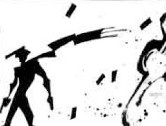 |
The Matrix
"The King of Never Return"
Online comic
Written and drawn by Ted McKeever
2000 |
Most people remain unaware of the
Matrix. Some get the chance to take the red pill or the blue
pill. But is there another choice?
Read the story at
the Internet Archive
Didja Know?
This story originally appeared on the official Matrix
website in 2000. It was later printed in
The Matrix Comics, Vol. 2 published by
Burlyman
Entertainment, a comic book publisher founded by the Wachowskis.
Characters appearing or mentioned in this story
Phoebe
Agents
Tellus
Europa
the Oracle (mentioned only)
The One/Neo (mentioned only)
Didja Notice?
On page 1, panel 2, the Hotel Ambush is seen in the
background. This is likely named for the title of a piece
from the soundtrack of The
Matrix by Don Davis. The piece accompanies the
scene where Morpheus, Neo and the rest are ambushed by
Agents at the Heart of the City Hotel after visiting the
Oracle.
On page 2, panel 1, a sign that reads "Musket Waltz, Bank of
Mexico" is seen on the bank that Phoebe robs. The
Bank of
Mexico is the central bank of Mexico, backed by the
Mexican government. I don't know why "Musket Waltz" would be
on the same sign unless the town has that name, which seems
unlikely. "Musket Waltz" is the name of a track from the
soundtrack of the 1987 film Walker. Maybe
writer/artist McKeever was noting musical tracks he was
listening to when he drew a particular panel.
| Europa creates a spaghetti western program for Phoebe
and Tellus to upload into for excitement. A "spaghetti
western" is an Italian-made film of the Western genre,
usually low budget and violent, the best-known among them
being Sergio Leone's A Fistful of Dollars (1964),
For a Few Dollars More (1965) and The Good, the
Bad and the Ugly (1966). One of the spaghetti western
faces seen on page 10 of the story appears to be actor Clint
Eastwood, who starred in these three films. |
 |
Back to The Matrix
Episode Studies